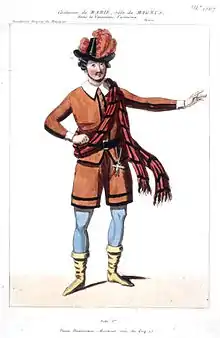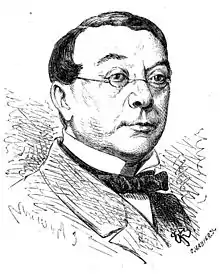Le vaisseau fantôme
Le vaisseau fantôme ("The Phantom Ship") is an opera in two acts and three tableaux by Pierre-Louis Dietsch to a French libretto by Paul Foucher and Bénédict-Henry Révoil, based on Captain Marryat's novel The Phantom Ship, Sir Walter Scott's The Pirate, as well as tales by Heinrich Heine, James Fenimore Cooper, and Wilhelm Hauff.[1] It was premiered on 9 November 1842 by the Paris Opera at the Salle Le Peletier and received 12 performances.
Background
Richard Wagner had submitted a scenario, Le hollandais volant (later to become famous as the opera Der fliegende Holländer), to Léon Pillet, Director of the Paris Opera, for a future French language opera by himself. Although Pillet was interested, he determined to contract librettist Paul Foucher and Dietsch to create the work.[2]
Premiere
The sets were designed by Charles-Antoine Cambon and Humanité-René Philastre. The costumes were designed by Paul Lormier. According to Nicole Wild, the eponymous ship only appeared on the poster, and the spectators searched for it in vain.[3]
Roles

| Role[4] | Voice type | Premiere Cast,[5] 9 November 1842 (Conducted by François Habeneck) |
|---|---|---|
| Erik | tenor | Octave |
| Minna | soprano | Julie Dorus-Gras |
| Troil | baritone | Canaple |
| Magnus | baritone | Marié |
| Barlow | bass | Ferdinand Prévost |
| Schriften | bass | Saint-Denis |
Synopsis
- Place: Scotland
- Time: Indefinite
Act 1
Scene 1: A large hall in the home of Barlow in the Shetland Islands. The curtain rises on an evening soirée.
Scene 2: Village of Shetland, with the sea in the background. On the right side, Barlow's house with front steps.
Act 2
A vast view of Shetland and the point of the island. A monastery on the left. A large boulder and the ship at anchor on the right in the background. A gloomy, turbulent sky with clouds.
Recordings
In 2014 Naïve Records released a recording of the opera conducted by Marc Minkowski, coupled with the original version of Der fliegende Holländer. The cast included Sally Matthews as Minna, Bernhard Richter as Magnus, Eric Cutler as Erik and Russell Braun as Troil.[6]
Notes
- Barry Millington (1992), Oxford Music Online.
- Annegret Fauser, Mark Everist - Music, Theater, and Cultural Transfer: Paris, 1830-1914 2009- Page 233 "Although the Opéra's administration was interested in the subject, it had other artists in mind to create the work, and 9 November 1842 saw the premiere of Pierre-Louis Dietsch's fantastic opera in two acts, Le vaisseau fantôme,"
- Nicole 1987, p. 269.
- l'Association l'Art Lyrique Français - Dictionnaire des Oeuvres Lyriques Françaises accessed 10 February 2014.
- 1842 libretto at Gallica.
- Rohan, Michael Scott. Review of recording of Le Vaisseau fantôme. Opera February 2014, Vol 65 No 2, p223-225.
Bibliography
- Millington, Barry (1992). "Fliegende Holländer, Der", vol. 2, pp. 228–231, in The New Grove Dictionary of Opera, 4 volumes. London: Macmillan. ISBN 9781561592289.
- Wild, Nicole (1987). Décors et costumes du XIXe siècle. Tome I. Opéra de Paris, pp. 269–270. Paris: Bibliothèque nationale, Département de la Musique. ISBN 9782717717532.

.jpg.webp)
.jpg.webp)